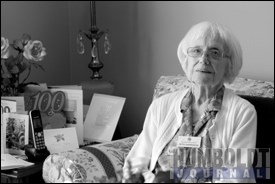In a tiny apartment tucked away in the corner at the end of a long corridor lives an elderly woman. The place is neat and well kept. Small collectibles adorn a shelf in an organized fashion below a modern TV. On a bench below the window sit some folded crocheted blankets. Only the birthday cards on the table in the corner suggest that the small lady in the wheelchair has a hundred years worth of memories.
"My 100th birthday was on Sunday, but we had the party on Saturday," said Rita Harrison. "My two little great-great-grandnieces performed a highland dance for me."
Rita was born on March 9, 1914 in Scotland as the second youngest of four girls. After the Second World War, she moved to Canada in 1947 with one of her sisters to see another sister get married. While her two oldest siblings decided to stay in Scotland, she and her travel companion decided to stay in Canada.
"We had no trouble getting jobs," said Rita. "But it was the money that was hard, which is why I moved."
While they originally landed in Toronto and spent two years there, Rita wasn't satisfied. She eventually moved out west to see her cousin and stay with her uncle and aunt for a bit. It was then that she went to the employment office and got a job with the city.
"I worked for the tax office in Saskatoon for 25 years. I was very good with math," she said. "I retired when I was 60."
Surprisingly, Rita never got married. She was always on her own and according to her, that's how she liked it. She was as independent as they come. It didn't even faze her to travel so far, either the first time to Toronto or the second time to Saskatchewan.
She doesn't have any regrets either, but that doesn't mean she didn't have times of hardship. She could remember some of her darkest moments as being those from the war years in Scotland. She was in the Royal Army Paid Corp. in an accounting position throughout nearly the entire Second World War.
"The blackouts were the worst. Everything closed at 6 p.m. and you had to turn off all the lights and put black drapes on the windows," she said. "If you opened the door and there was a light on, you could see it from three miles up in the sky. They'd be at your door telling you to put out the light."
During those times, she would often hear sirens warning that the Germans were coming. All they had then was a flask with a "wee light" to see by, but they managed.
"You do what you have to do. It's as simple as that," she said. "Eventually, you get used to it."
The church bells weren't rung during the war years either, which left the city shrouded in darkness and silence after 6 o'clock. Times were rough and Rita's family wasn't very well to do. They lived on coupons like most other people at the time.
"We got eight coupons that had to last us for eight months, sometimes longer," she said. "Sometimes we only got five coupons. We couldn't afford to get sugar or cream. I learned to drink black coffee and never got back on cream or sugar to this day."
It's at moments like this where Rita pauses in between speaking and stares straight ahead with a pensive expression. It takes her a few seconds before she starts speaking again.
"You couldn't do anything," she said finally. "It's surprising what you can get used to."
As she described living conditions back then, it was easy to see that you lived on what you had and made do the best you could. People went about their lives sharing what they could spare. Any old clothes that didn't fit were dropped off with neighbours.
"The sirens would screech at 2 a.m. to signal an air raid was coming," said Rita. "You couldn't even light a cigarette outside after dark because it could be seen in the sky."
Apparently if one person was walking around with a light, it had to have two layers of tissue over it to dim it and it had to be facing down. There would also be a trail of people following along behind so they could find their way in the dark.
"'Obscure all the lights.' I always remember that," she said.
When it was announced that the war was over, Rita said it was two in the morning and people were dancing in the street. That didn't mean it was over for those working in the forces, like Rita. Their jobs continued until their names were called and they were discharged. For Rita, that was about a year after the war ended.
A year after that, she and her sister moved to Canada.
After 27 years of living and working here, Rita retired. She then spent the next five years traveling around Europe, visiting family and generally enjoying herself. She returned home, where she eventually ended up in her quaint little apartment at Caleb Village.
Her family does come and visit every once in a while, but she confesses that it gets lonely. None of her family from her generation is alive anymore. Her cousin who she came to visit so many years ago also recently passed away.
"Now everyone is gone. I'm the last one," she said.
Despite this, Rita spends her time and her talents helping others. On the bench next to her below the windowsill are two folded blankets.
"I do knitting for the Salvation Army," she said. "I crochet blankets for the poor children."
She may look dainty, but Rita Harrison is a centenarian with nimble fingers and a backbone of steel.




